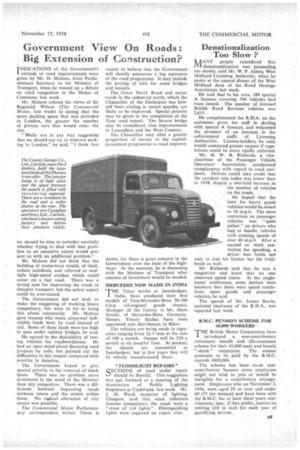Denationalization Too Slow ?
Page 43

If you've noticed an error in this article please click here to report it so we can fix it.
TtITANY people considered that !VI denationalization was proceeding too slowly, said Mr. W. P. James, West Midland Licensing Authority, when he spoke at the annual dinner of the West Midland Area of the Road Haulage Association last week.
He said that in his area, 189 special A licences covering 594 vehicles had been issued. The number of licensed British Road Services vehicles was 2,615.
He complimented the R.H.A. on the assistance given his staff in dealing with special A licences, and welcomed the prospect of an increase in the enforcement staffs of Licensing Authorities. Licence-holders, he said, would command greater respect if regulations could be more rigidly enforced. Mr. H. W. B. Richards, a vicechairman of the Passenger Vehicle Operators' Association, condemned complacency with regard to road accidents. Drivers could take credit that the accident rate today was lower than in 1938, despite a two-fold increase in the number of vehicles on the roads.
He hoped that the limit for heavy goods vehicles would be raised to 30 m.p.h. The same restriction on passenger vehicles was "quite unfair" on drivers who had • to handle vehicles with cruising speeds of over 40 m.p.h. After a second or third conviction for speeding, a driver was liable not only to lose his licence but his livelihood as well.
Mr. Richards said that he was a magistrate and knew that no one observed speed limits. At the magistrates' conference, some justices were unaware that there were speed restrictions upon goods and passenger vehicles, he said.
The speech of Mr. James Barrie, national chairman of the R.H.A,, was reported last week.
B.M.C. PENSION SCHEME FOR 45,000 WORKERS
THE British Motor Corporation have introduced a non-contributory retirement benefit and life-assurance scheme for their 45,000 male and female
" check " • employees. The annual premium to be paid by the B.M.C. exceeds £400,000.
The scheme has been made noncontributory because some employees might not wish to join or would be ineligible for a contributory arrangement, Employees who on November 3, 1954, were aged 25 or over and under 60 (55 for women) and have been with the B.M.C. for at least three years continuously, may, if they prefer, receive on retiring £10 in cash for each year of qualifying service.




































































































